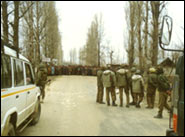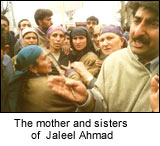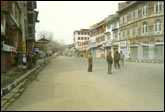There is one commodity that has no value, no
meaning, in Kashmir today.
Human life.
On Thursday, around 2300 hours IST, we were in Haigam, on National Highway 1, en
route to Baramulla.

There were demonstrators on the road -- angry, shouting slogans, holding
placards, but controlled by their leaders who, like shepherds, used
small sticks to keep them in line.
They were protesting against their villager Jaleel Ahmad Shah's killing. A
medical shopkeeper, he was shot in custody by the Special Operations
Group of the state police, the protestors alleged.
On the blocked road were long queues of civilian and army vehicles.
Once they recognised us for press personnel, the crowd played to the
cameras, their 'We want freedom' shouts taking on a higher pitch.
A decade-plus of militancy has made them naturals before -- and
respectful of -- the media. Which was why a little later, on our request
they parted way for us ('Without the press, Kashmiris would have died
unheard') as blocked army personnel watched.
"We don't want to create trouble, we will clear the road as soon as we
receive the body," one of the demonstrators assured us.

The last we saw of Haigam was security personnel, on orders from a three-starred officer, taking positions near their vehicles.
"Stand there," we heard him say. "Don't let them anywhere near."
A little later, four of the demonstrators were dead. In a matter of
seconds, Haigam, agitating against one killing, witnessed another
four.
People here say that killings -- custodial or otherwise -- in the time
of cease-fire (or 'non-initiation of combat operations', as security
personnel call it) is nothing new.
The police version is that Jaleel Ahmad was a militant and was killed in
an encounter -- a claim that very few believe here.
"That's how they operate during cease-fire," many will tell you between
Kupwara, Baramulla and Srinagar. "Kill somebody and then say he fired
upon them and was shot in the encounter!"
It is the SOG that is blamed for most of such deaths. As per the
All-Parties Hurriyat Conference's count till January, 18 people were
killed in custody during the cease-fire period. The claim, as of now, is over 25.
A case in point is the death of the forest department driver, whose
vehicle was used to carry out the fidayeen attack on Srinagar
airport.
The police say the driver led them to a cache of arms and was killed
when the personnel accompanying him came under attack from militants
there.

There are many in the Valley who believe that such killings are
masterminded by the SOG "on Farooq Abdullah's orders, to sabotage the
cease-fire".
If such is the case, Jaleel Ahmad's death has contributed much to that
cause.
Imagine: a whole village protesting on the road. Along comes an army
convoy, which open fires. Six killed, 26 injured. More
protests, curfew and pelting in Srinagar. Firing, one dead, more
pelting...
And in Haigam and nearabouts? Even as we file this story, people are out
protesting. Since morning they have been on the road, blocking traffic,
burning tyres, damaging vehicles.

"There is no vehicle on the road, not even a cycle," reported Fayaz
Bhat, a resident of Baramulla district. "There were huge crowds in front
of the United Nations office [in Baramulla].
"Leaders of the Hurriyat Conference are here," he continued. "The people
regrouped after prayers, and are on the roads in a spontaneous massive
procession in Baramulla town. Demonstrations are on in Sopore too."
On Wednesday, it was Jaleel Ahmad Shah. Thursday, six of his villagers.
And Friday, as of now, a 14-year-old boy.
One minute alive. The next, killed.
This is Kashmir.
Back to top
Tell us what you think of this report